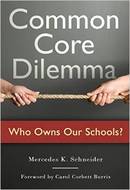On February 11, 2016, the Fordham Institute published its idea of a report on how well a number of assessments align with the Common Core State Standards (CCSS). Here is a bit of what Fordham Institute wrote about ACT:
ACT Aspire and MCAS both did well regarding the quality of their items and the depth of knowledge they assessed.
Still, panelists found that ACT Aspire and MCAS did not adequately assess--or may not assess at all--some of the priority content reflected in the Common Core standards in both ELA/Literacy and mathematics.
That same day, ACT responded with a statement to the effect that ACT aligns "with college and career readiness standards":
The finding that ACT Aspire assessments adequately assess many but not all of the priority content reflected in the Common Core standards is not surprising. Unlike other assessments included in the study, ACT Aspire is not and was never intended to measure all of the CCSS. Rather, ACT Aspire is designed to measure the skills and knowledge most important in preparing students for college and career readiness. This is a significant philosophical and design difference between ACT Aspire and other next generation assessments. ACT has made the choices we have to align with college and career readiness standards, rather than specifically to the Common Core, and we intend to keep it that way. [Emphasis added.]
According to the above, ACT states that "college and career readiness standards" are not one and the same as CCSS. In fact, based upon the statement above, ACT snubs both CCSS and those who consider CCSS the center of the standards universe by implying that to be aligned with CCSS is a narrow alternative to "college and career readiness."
So, what of these other "college and career readiness standards?"
They are scoring rubrics on ACT's website. ACT calls them ACT College and Career Readiness Standards:
Here are the ACT English standards...
the ACT math standards...
the ACT reading standards...
the ACT science standards...
and the ACT writing standards.
The scoring rubrics used to be called the ACT College Readiness Standards, but in May 2013, ACT renamed them the ACT College and Career Readiness Standards.
And in May 2013- almost three years after CCSS was officially launched- ACT also proclaimed that it was first to define "work readiness":
IOWA CITY, Iowa--ACT released a new report today that establishes, for the first time, a definition of work readiness and defines the types and levels of skills needed to succeed in the workplace. As the leader in creating evidence-based solutions designed to document and develop the skills of America's workforce, ACT is working to solve the mismatch in worker skills and employer needs.
In the report, "Work Readiness Standards and Benchmarks," ACT articulates the specific factors important for an individual to experience success in the workplace throughout a lifetime. Those factors include:
what skills individuals must achieve to secure jobs currently in demand,
how to build the foundation for multiple job transitions throughout a career, and
how to align education and training programs to current job skill requirements.
"ACT developed the first evidence-based definitions of the skills needed to transition from high school to postsecondary education," said Jon Whitmore, chief executive officer of ACT. "Today we are adding to that record by introducing empirically-based standards and benchmarks that define what is needed to transition from both secondary and postsecondary programs to employment. It's all part of our mission to help people achieve education and workplace success."
This makes for an interesting situation. ACT was on the inside of CCSS development, and even as ACT was advising on CCSS development (and therefore supportive of CCSS), it must have known that it would have to deal with future pressures to become "CCSS aligned."
On February 16, 2016, I emailed the ACT media relations about the ACT-implied difference between CCSS and "college and career readiness. ACT's senior director of media relations, Ed Colby, responded. The following was included in his reply:
ACT supports the Common Core State Standards and actually helped develop them. They were informed by our research. And, all of the skills that we measure in ACT Aspire and the ACT are aligned to the CCSS. But we don't measure all of the CCSS; we focus only on those skills that our research has validated are essential to college readiness.
On February 17, 2016, I replied as follows:
Edward, thank you for your response. I have some more questions. First of all, what percentage of Common Core does ACT measure?
He responded:
We really don't have a specific answer to your question below, as it is more complicated than that. We offer tests in five subject areas (English, math, reading, science, and writing) on both ACT Aspire and the ACT test across 10 grade levels, and we focus on the skills most important to college and career readiness in each subject for each grade level. So, the coverage of any standards would vary by grade level and subject area. Plus, standards have varying degrees of breadth and depth. So the answer is not cut and dry in terms of what percent of the Common Core standards we do and don't cover.
I replied with the following question:
Edward, how about a couple of examples of CC math and ELA standards that ACT/Aspire excludes for not being supported by ACT research. Could you please provide?
After a bit of back-and-forth, Colby did respond to the above question.
To read his response regarding specific examples of Common Core standards not tested by ACT, see this February 19, 2016, follow-up post.
***
Modified version originally posted 02-17-16 at deutsch29.wordpress.com
Schneider is a southern Louisiana native, career teacher, trained researcher, and author of the ed reform whistle blower, A Chronicle of Echoes: Who's Who In the Implosion of American Public Education.
She also has a second book, Common Core Dilemma: Who Owns Our Schools?.



